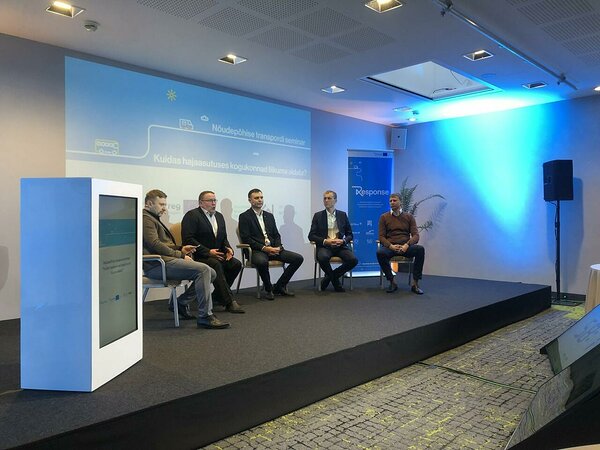Seminar: Demand-responsive transportation could help to improve the mobility of people living in sparsely populated areas in Estonia
Around 150
representatives from local governments, public transport centres, ministries
and other agencies met at the beginning of December to discuss the future of demand-
responsive
transportation in sparsely populated areas of Estonia.
The seminar, organized by Stockholm Environment Institute Tallinn Centre and Modern Mobility, introduced some of the results of project RESPONSE and the lessons learned from the DRT pilot on Estonian biggest island, Saaremaa. One of the key topics was also the role of the government in supporting on-demand transport.
SEI Tallinn's expert and RESPONSE project manager Merlin Rehema argued that we need to update our understanding of the nature of public transport while adapting to the new environment of population distribution, reasons for travel and expectations of users. "Demand-responsive transportation offers a great alternative to regular bus services in low-density areas because it is based on the needs of travellers and offers flexible solutions based on those needs," explained Rehema.
Estonian environmental minister Erki Savisaar opened the seminar and suggested that demand-responsive transportation has the potential to become one of the supporting solutions in Estonia's climate goals. "It is a known fact that the transport sector's contribution in achieving climate neutrality is very important and we have to find ways to transition to environmentally-friendly transportation. The largest savings come from the energy left unspent. Meaning, the best way to cut transport emissions is to drive when necessary to places necessary," said Savisaar.
The seminar gave the first insight into the demand-responsive transport model developed in the RESPONSE project. It was explained how it could help determine on-demand transportation needs and help implement the new system. According to Merlin Rehema, the tool allows modelling of the cost and flexibility of on-demand solutions and compares the results to current services. "Hopefully, this tool will find good use and reduces the hesitations around the cost or quality of service," Rehema said.
In the
framework of the RESPONSE project, the first steps in bringing on-demand
transportation to Estonia have been made. In the summer of 2021, Saaremaa
municipality started developing the demand-responsive transport model together
with private company Modern Mobility. Traveller's experience with the pilot has
been good so far. "First months have shown that the service has met the
needs of different target groups, and the feedback from the community has been
mostly very positive," shared Kaarel Tang from Saaremaa Municipality
Government.

